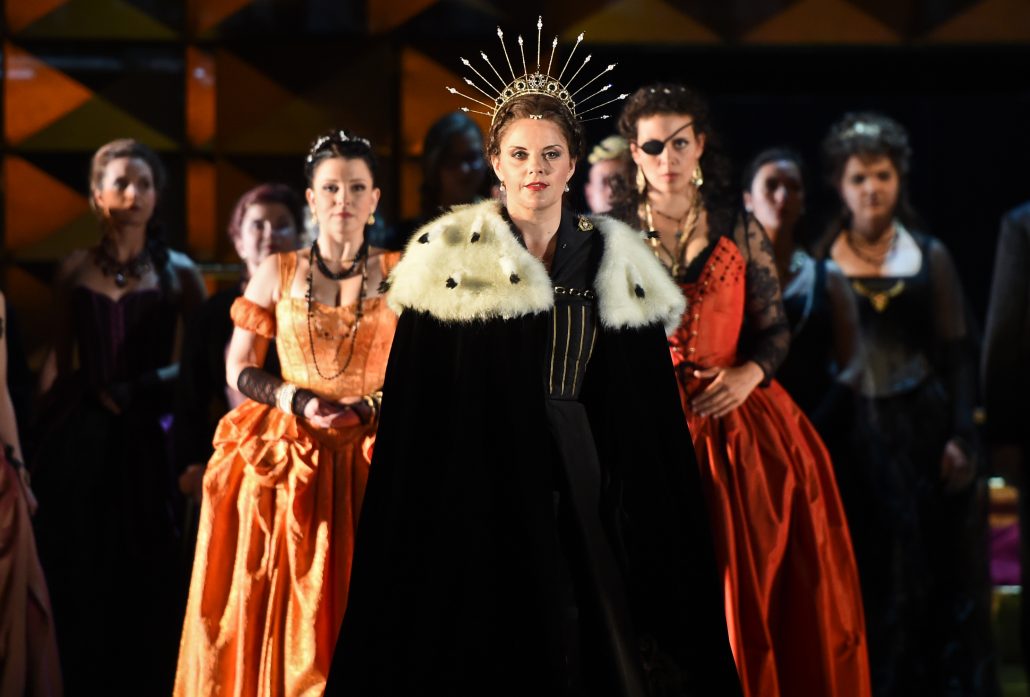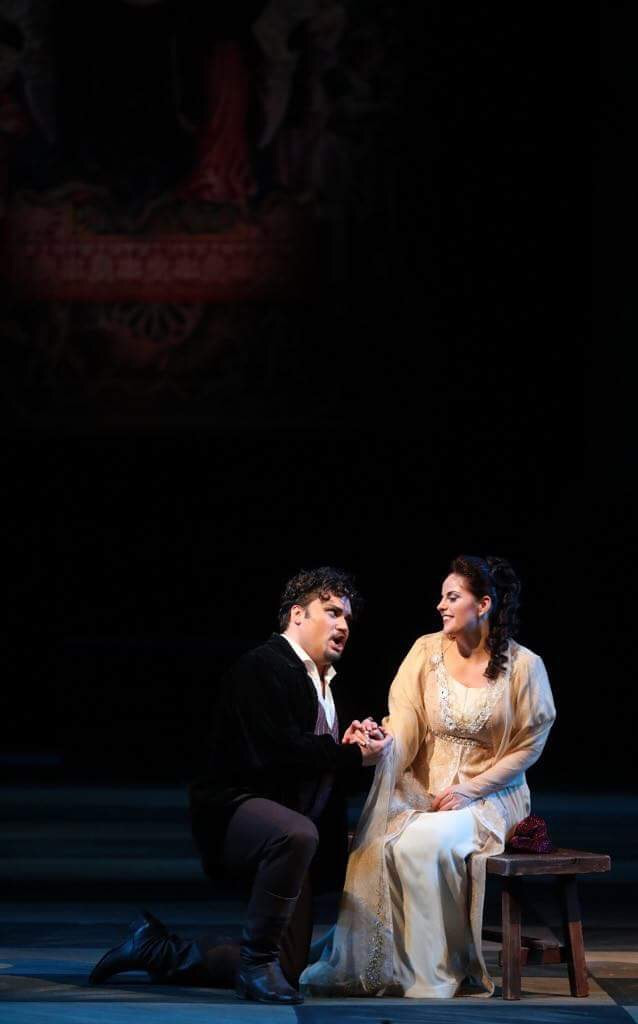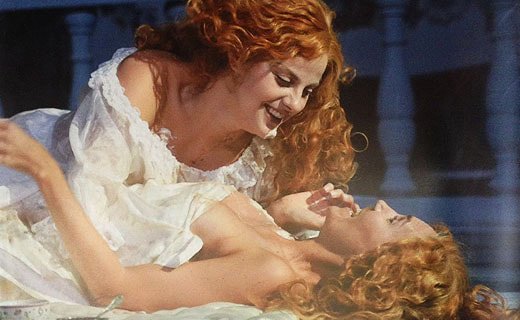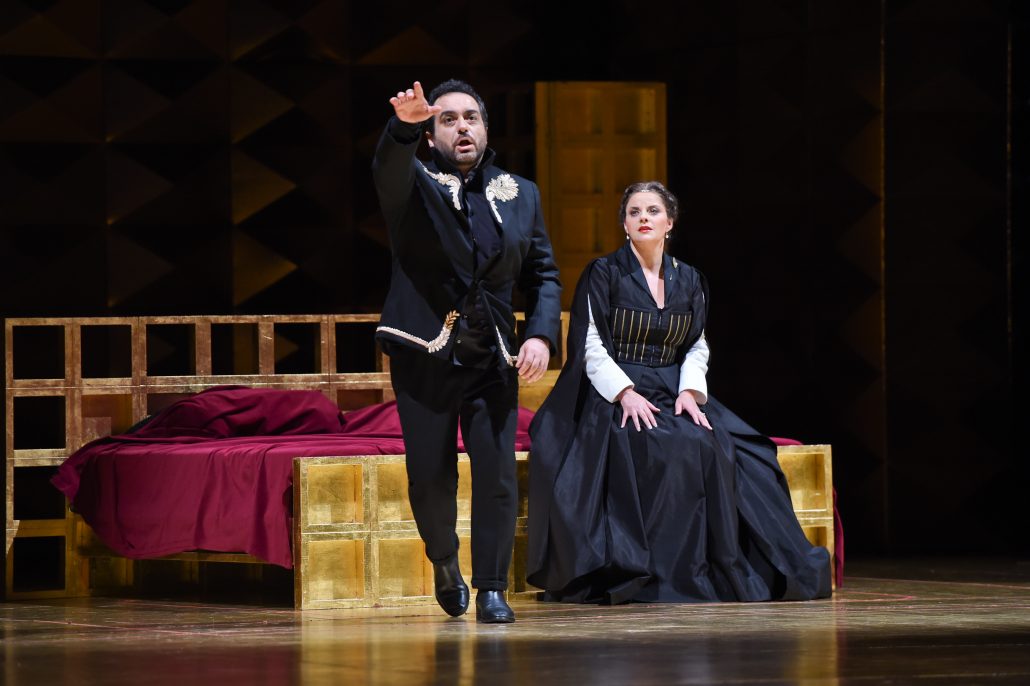Celine Byrne is a lyric soprano from Kildare, Ireland.
Celine is now recognised nationally and internationally as one of opera’s great stars. A performer of ‘fine lyrical quality and a touching actor’, Celine made her operatic début 2010 singing the role of Mimi in La Bohéme. By 2012 she was to be heard at the Royal Opera House, Covent Garden in the lead role of Dvorak’s Rusalka which she took over at very short notice. Soon afterwards she was invited back to sing 1 Blumenmädchen in Parsifal followed by Micaela in Carmen and, in the seasons that have followed, she has performed extensively throughout Europe as well as in the United States, China, Russia and Mexico. Recent roles include Donna Elvira with Israeli Opera in Tel Aviv conducted by Daniel Oren and directed by Kasper Holten, Floria Tosca (Tosca) Mikhailovsky Opera, St. Petersburg, Liu (Turandot) Leipzig and Deutsche Oper am Rhein, Düsseldorf, followed by Elizabeth in Verdi’s Don Carlo.
A frequent concert performer, Celine is very familiar to both Irish and international audiences and has also performed with world-renowned tenors José Carreras, Roberto Alagna and Joseph Calleja. Future engagements include concerts with Josè Carreras in Europe, China, Russia and Thailand having performed her 30th concert with him at The Royal Albert Hall in May last year. Celine has also performed in concert with Bryn Terfel and recently sung with him and Borusan Philharmonic Orchestra conducted by Sasha Goetzel. Recent concerts include Richard Strauss’ Vier Letzte Lieder in Austria, a recording of Verdi’s Requiem with the Prague Radio Symphony Orchestra conducted by André Lenard and a concert with The Sun Valley Summer Symphony in America.
Last season Celine made her Irish National Opera and also made her American opera debut as Magda in Puccini’s La Rondine with Minnesota Opera, Madama Butterfly in Staatstheater Kassel. Die Marschallin in Der Rosenkavalier in Santiago and Marietta/Marie in a concert performance of Korngold’s Die Tote Stadt with RTÉ National Symphony Orchestra in the NCH, Dublin. 19/20 season highlights include Celine’s debuts at the Opéra National de Paris as Ortlinde in Wagner’s Die Walküre, Micaela in Carmen with INO and Mimi in La Bohéme at Hamburg State Opera.
Website: https://celinebyrne.com/
Celine is now recognised nationally and internationally as one of opera’s great stars. A performer of ‘fine lyrical quality and a touching actor’, Celine made her operatic début 2010 singing the role of Mimi in La Bohéme. By 2012 she was to be heard at the Royal Opera House, Covent Garden in the lead role of Dvorak’s Rusalka which she took over at very short notice. Soon afterwards she was invited back to sing 1 Blumenmädchen in Parsifal followed by Micaela in Carmen and, in the seasons that have followed, she has performed extensively throughout Europe as well as in the United States, China, Russia and Mexico. Recent roles include Donna Elvira with Israeli Opera in Tel Aviv conducted by Daniel Oren and directed by Kasper Holten, Floria Tosca (Tosca) Mikhailovsky Opera, St. Petersburg, Liu (Turandot) Leipzig and Deutsche Oper am Rhein, Düsseldorf, followed by Elizabeth in Verdi’s Don Carlo.
A frequent concert performer, Celine is very familiar to both Irish and international audiences and has also performed with world-renowned tenors José Carreras, Roberto Alagna and Joseph Calleja. Future engagements include concerts with Josè Carreras in Europe, China, Russia and Thailand having performed her 30th concert with him at The Royal Albert Hall in May last year. Celine has also performed in concert with Bryn Terfel and recently sung with him and Borusan Philharmonic Orchestra conducted by Sasha Goetzel. Recent concerts include Richard Strauss’ Vier Letzte Lieder in Austria, a recording of Verdi’s Requiem with the Prague Radio Symphony Orchestra conducted by André Lenard and a concert with The Sun Valley Summer Symphony in America.
Last season Celine made her Irish National Opera and also made her American opera debut as Magda in Puccini’s La Rondine with Minnesota Opera, Madama Butterfly in Staatstheater Kassel. Die Marschallin in Der Rosenkavalier in Santiago and Marietta/Marie in a concert performance of Korngold’s Die Tote Stadt with RTÉ National Symphony Orchestra in the NCH, Dublin. 19/20 season highlights include Celine’s debuts at the Opéra National de Paris as Ortlinde in Wagner’s Die Walküre, Micaela in Carmen with INO and Mimi in La Bohéme at Hamburg State Opera.
Website: https://celinebyrne.com/
| Opera has been a constituent part of Irish culture and cultural life for over 300 years. It has deeply enriched the cultural life of the country and its citizens in different ways at different times in history, and produced a long tradition of Irish creative and performing opera artists who have made and continue to make significant international contributions to the development of opera throughout the world. Opera in Ireland in the early 18th century, as in the rest of Europe, revolved around royal patronage. In Ireland, this meant the vice-regal court based in Dublin and its attendant concert life. Johann Cousser (an important figure in European opera prior to his settling in Ireland) was the most prominent of the early composers of opera and operatic works in Ireland[1], and it was to a thriving scene the greatest opera composer of the age - Handel – later came to spend a profitable year in Dublin[2] in 1741/42. In the later part of the century, Irish operatic artists began to become prominent internationally – the tenor Michael O’Kelly[3], who befriended Mozart and performed in some of his operas, being the most well-known example. In the nineteenth century, as commercial public performances came to dominate the opera and music economy, Dublin, as the second city of the British Empire, reflected and occasionally rivalled London as one of the world’s great operatic centres, and there was also now regular opera in Belfast, Cork, Limerick and Waterford. Irish audiences became avid consumers of the great operas of the age - with regular performances in Dublin of recently composed operas by Mozart, Auber, Weber, and Rossini amongst many others, and visits by the greatest international music and opera performers of the age were relatively common. |
Dubliner Michael William Balfe (1808-1870) became one of the most globally successful opera composers of the mid-century. A protégé of Rossini, he composed 28 operas, and was a leading exponent of Italianate bel-canto opera, with performances by opera houses all over Europe. He later developed a highly successful style of ballad-opera in English and his Bohemian Girl was enormously popular – becoming the most frequently produced opera in the English speaking world in the third quarter of the century. Waterford-born William Vincent Wallace (1820-1865) had a major international career as a composer and virtuoso violinist-pianist in London, Australia, and the USA. He composed eight operas with considerable international success. Major international Irish operatic performers such as Limerick’s Catherine Hayes[4] were also part of international operatic life and amongst the earliest and most well-known Irish global ‘cultural ambassadors’.
| In the twentieth century opera continued as a strong current of Irish culture. Operas and operatic singing were a mainstay of popular culture in Ireland, operas and operatic concerts had a broad following across social strata in the main urban centres, and a number of operas in Irish were composed as part of the Gaelic cultural revival. As commercial touring companies waned, as the main producers of opera post-independence, they came to be replaced by voluntary organisation operatic societies in many Irish towns and cities, most of which mounted performances with professional casts and creative teams to large, broadly-based local audiences. These included the Dublin Grand Opera Society and the specialist niche-repertoire Wexford Festival Opera, as well as producing grand opera societies in regional cities such as Cork, Waterford, Limerick, Kilkenny, and even in smaller centres such as Kilrush in Co. Clare. |
Irish opera performing artists continued throughout the early part of the century to have international careers – Margaret Burke-Sheridan was a collaborator in creating some of the great Puccini roles and John McCormack became one of the first great international operatic recording superstars. Charles Villiers Stanford was the most internationally noted Irish composer of opera of the period.
In the second part of the 20th Century, Irish composers continued to show strong interest in composing operas and notable figures such as Raymond Deane and Gerald Barry emerged, the latter gaining a significant international reputation. Irish operatic performers such as Ann Murray and Patricia Bardon continued to achieve major international acclaim, but worked almost exclusively abroad. This has continued into the early 21st century, with new artists such as composer Donnacha Dennehy and performers like Tara Erraught, Paula Murrihy, and Gavan Ring establishing major reputations abroad.
| A new Irish National Opera company which gave its first productions in 2018 is now the largest producer of opera in Ireland, restoring regular production of large–scale operas in Dublin as well as continuing Opera Theatre Company’s remit of touring smaller-scale productions to regional venues throughout Ireland and with a range of artist and audience development programmes. In addition, sustained support of the internationally celebrated Wexford Festival Opera continues and a range of ‘independent’ productions are also supported annually along with a programme of supports for individual opera artists. With the establishment of Irish National Opera, many of Ireland’s international opera stars are now beginning to be seen regularly in Ireland, emerging Irish opera artists have increased opportunity, new Irish operas are coming to the national international stage more frequently and there is a notable renaissance of energy and interest in opera in Ireland. |
[1] A recent Arts Council funded music project has discovered, performed in concert and recorded a 1711 operatic serenata by Johann Cousser/Kusser (1660-1727), a series of these by Cousser were probably the first operatic works composed in and for Ireland. He was appointed "Chief Composer" and "Master of the Musick, attending His Majesty's State in Ireland" in 1626. Previously working in France, Germany and London before moving to Dublin in 1707, Cousser was a significant influence on a younger generation of European opera composers, including Handel.
[2] Having dominated opera in London in the previous decade, Handel’s 1742 Dublin visit during which he performed, premiered the Messiah and undertook several other musical projects is now well documented.
[3] Michael O’Kelly (1762-1826) – Dublin born Irish tenor who performed in Italy, Vienna and London, knew Salieri & Haydn, befriended Mozart and appeared in a number of his stage works in a glittering career.
[4] Limerick- born Catherine Hayes (1818-1861) had a spectacular international career in Europe and in the USA, and also performed in Ireland as part of a regular international star performer visits such as those by Liszt (with whom she shared a concert bill in Dublin).
[2] Having dominated opera in London in the previous decade, Handel’s 1742 Dublin visit during which he performed, premiered the Messiah and undertook several other musical projects is now well documented.
[3] Michael O’Kelly (1762-1826) – Dublin born Irish tenor who performed in Italy, Vienna and London, knew Salieri & Haydn, befriended Mozart and appeared in a number of his stage works in a glittering career.
[4] Limerick- born Catherine Hayes (1818-1861) had a spectacular international career in Europe and in the USA, and also performed in Ireland as part of a regular international star performer visits such as those by Liszt (with whom she shared a concert bill in Dublin).























